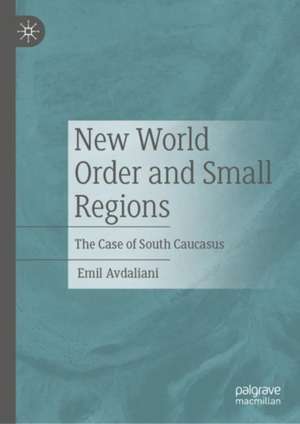New World Order and Small Regions: The Case of South Caucasus
Autor Emil Avdalianien Limba Engleză Paperback – 31 aug 2023
| Toate formatele și edițiile | Preț | Express |
|---|---|---|
| Paperback (1) | 637.46 lei 43-57 zile | |
| Springer Nature Singapore – 31 aug 2023 | 637.46 lei 43-57 zile | |
| Hardback (1) | 641.71 lei 43-57 zile | |
| Springer Nature Singapore – 30 aug 2022 | 641.71 lei 43-57 zile |
Preț: 637.46 lei
Preț vechi: 749.95 lei
-15% Nou
Puncte Express: 956
Preț estimativ în valută:
121.97€ • 127.70$ • 100.93£
121.97€ • 127.70$ • 100.93£
Carte tipărită la comandă
Livrare economică 07-21 aprilie
Preluare comenzi: 021 569.72.76
Specificații
ISBN-13: 9789811944192
ISBN-10: 9811944199
Ilustrații: XI, 237 p. 1 illus.
Dimensiuni: 148 x 210 mm
Greutate: 0.34 kg
Ediția:1st ed. 2022
Editura: Springer Nature Singapore
Colecția Palgrave Macmillan
Locul publicării:Singapore, Singapore
ISBN-10: 9811944199
Ilustrații: XI, 237 p. 1 illus.
Dimensiuni: 148 x 210 mm
Greutate: 0.34 kg
Ediția:1st ed. 2022
Editura: Springer Nature Singapore
Colecția Palgrave Macmillan
Locul publicării:Singapore, Singapore
Cuprins
Introduction.- Literature Review.- Chapter One: South Caucasus and the Shifting Global Balance of Power.- Chapter Two: South Caucasus – Return of Great Power Competition.- Chapter Three: Turkey’s Evolving Approach to the Black Sea and the South Caucasus Region.- Chapter Four: Russia’s Return to the South Caucasus.- Chapter Five: Iran’s Changing Strategic Position in the South Caucasus.- Conclusion.
Notă biografică
Emil Avdaliani is Professor of International Relatios at European University, Tbilisi, Georgia and the head of Middle East Studies at Geocase. He is also columnist at CEPA, RUSI, Begin-Sadat Center for Strategic Studies, and Georgia Today.
Textul de pe ultima copertă
The book provides a comprehensive understanding of the unfolding geopolitical changes in the South Caucasus in the age of increased great power competition across Eurasia. Recent research on the geopolitics of the South Caucasus focuses either on interstate relations among Armenia, Azerbaijan and Georgia or on each of regional actor’s (Russia, Turkey and Iran) ties with the region’s one or all three states. Little attempt has been made to see the region’s shifting geopolitical importance from a global perspective: growing US-China rivalry and shifting balance of power in Eurasia; recalibration of the US’ military and diplomatic vision in western Eurasia to adjust to the Chinese challenge. The book argues, from a theoretical point of view, that the increased competition in the region fits into the global pattern of unfolding great power competition, when military and economic calculations drive regional powers to increase their influence on immediate neighborhoods sidelining thecollective West from the negotiating table and the emerging new security architecture.
Emil Avdaliani is Professor of International Relatios at European University, Tbilisi, Georgia and the head of Middle East Studies at Geocase. He is also columnist at CEPA, RUSI, Begin-Sadat Center for Strategic Studies, and Georgia Today.
Emil Avdaliani is Professor of International Relatios at European University, Tbilisi, Georgia and the head of Middle East Studies at Geocase. He is also columnist at CEPA, RUSI, Begin-Sadat Center for Strategic Studies, and Georgia Today.
Caracteristici
Provides analytical reflection on geopolitical changes in and around the Caucasus Analyzes role of the region within the evolving geopolitical discourses of regional powers – Russia, Turkey and Iran Applies theoretical approaches to foreign policies of Russia, Turkey and Iran
